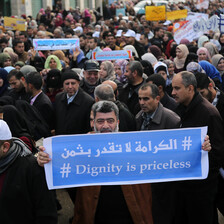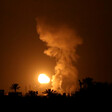The Electronic Intifada 2 September 2021

Thousands in Gaza remain displaced after their homes were destroyed or damaged during Israel’s aggression in May. Others have been forced to move back into what remains of their homes.
APA imagesAt the beginning of July, Nisreen al-Awour, 40, and her 15 children were informed they had to leave a school run by the UN in the Jabaliya refugee camp.
Nisreen had been displaced during Israel’s aggression on Gaza in May, when her house – in the Sudaniya area of northwestern Gaza – suffered massive damage in one of Israel’s bombing raids that month.
There had been no possibility of reconstruction in the intervening period. The house remained as damaged as when she left it, and she was afraid to move back to a house that barely provided shelter for her husband, Ashraf, who is in poor health and had chosen to stay in order to safeguard what was left of the family’s home when it was bombed.
But she was left with no choice. Today, she and Ashraf and their 15 children are sheltering in what remains of their home – three walls are barely standing and the roof is full of holes – and Nisreen is angry and upset at the UN for letting her family down.
“My house is unlivable,” Nisreen told The Electronic Intifada. “I am afraid the walls might fall on us suddenly.”
Some 91,000 people in Gaza were displaced during the May bombardment.
Most have since returned to their homes, but in late June for more than 8,000 people with homes totally or partially destroyed that simply was not possible. Nisreen and her family would be safer in alternative housing than in the remnants of their home, but have no other recourse.
And with Israel sealing Gaza’s borders to most building materials, reconstruction of the 2,000 homes that were so damaged as to be uninhabitable has been effectively prevented.
Many of the people displaced had sought refuge at facilities belonging to the UN agency for Palestine refugees, UNRWA, which is the largest provider of aid in an area in which more than 70 percent of a population of some two million are refugees.
But come summer, UNRWA, chronically underfunded despite the renewal of US aid, wanted their buildings back to run summer camps for children.
Incendiary remarks
Along with Nisreen’s family, another 22 families were made to leave the school in Jabaliya, while eight families had to vacate their places at an UNRWA school in the Beach refugee camp.
Some received help with rent, but only, according to UNRWA, if their homes had been completely destroyed in May. Most had to seek shelter with relatives or return to the shells of their old homes.
Still, all this might have passed as just another hardship of the extraordinarily tough living conditions in the besieged Gaza Strip had it not been for some extremely ill-judged remarks made by one of UNRWA’s senior officials that described Israel’s strikes on Gaza in May as sophisticated.
“I have the impression there is a huge sophistication in the way the Israeli military struck over the 11 days,” Matthias Schmale, UNRWA’s director of operations in Gaza, told an Israeli TV channel on 23 May, not long after the attack had ended.
He acknowledged that “more than 60 children were killed, 19 of whom went to UNRWA schools.” But somehow that suggested to him that “the precision was there” even as he called the deaths of civilians “unacceptable and unbearable.”
Unsurprisingly, his remarks went down extremely poorly, especially in Gaza. UNRWA cost-cutting measures and job reductions over the past few years coinciding with Schmale’s appointment have come to be seen as an attempt at undermining the rights of Palestinian refugees generally.
Two human rights organizations, the Palestinian Center for Human Rights and the Palestinian Human Rights Organizations Council, issued a joint statement condemning his remarks, which, they wrote, “completely ignored the crimes committed during the latest Israeli offensive.”
Angry voices online, both from Gaza and outside, denounced his comments or called for his resignation while protests were arranged in front of UNRWA’s offices in Gaza that drew hundreds of people.
Schmale apologized for his comment and the agency’s Commissioner-General, Philippe Lazzarini, issued a written statement on the subject.But the damage was done. UNRWA recalled Schmale and his deputy to Jerusalem where Schmale remains as “acting chief of staff.”
No choice but to protect our children
Those remarks were the culmination of a series of missteps by Schmale that left both his personal credibility and that of UNRWA at a low ebb in Gaza.
Schmale took up his position in 2017, a year before the Trump administration cut US funding to the agency. His arrival, however, soon coincided with the slashing of UNRWA’s budget. He became hugely unpopular when the agency revealed plans for hundreds of job reductions in 2018 following Trump’s cruel cuts.
Then UNRWA announced it would reform its food aid system, sparking fears that tens of thousands would sink deeper into poverty.
And finally, the agency was woefully underprepared in May, when it was suddenly faced with tens of thousands of people displaced by Israel’s onslaught.
Indeed, it was not only underprepared. For a while, UNRWA staffers actively tried to prevent the desperate displaced from entering agency premises.
Nisreen and her children were among their number after surviving a close call.
They had been expecting it.
“Every night of the last aggression, I would place my children in different corners of the house,” Nisreen told The Electronic Intifada.
“But on the evening of 14 May, after the bombing intensified, we gathered in one room. We were 19 people including my husband, daughter-in-law and her child. I believed that if we died together, no one would have to suffer mourning the others.”
It was a wise decision. Heavy Israeli bombing in the area on the night between 14 May and 15 May caused the house to nearly collapse.
But no one inside was harmed. And that was when they decided to leave for the relative safety of an UNRWA facility.
At the Jabaliya school, however, Nisreen found hundreds of other desperate people, and the gates locked.
Muhammad Awadallah, 33, was there too. Fleeing with his wife and four daughters from an intense bombardment near their home in the village of Umm Nasr in northern Gaza, he was not going to let some closed gates stop him from reaching relative safety.
“When they refused to receive us, we had no choice but to break the gate,” he told The Electronic Intifada. “We have no choice but to protect our children.”
Deliberate neglect
An UNRWA spokesperson conceded that the agency had been unprepared and was not at first willing to host people displaced in the assault.
“There were instructions from management that no one was allowed access to schools, but we changed these decisions within the first hour of people’s displacement,” Adnan Abu Hasna told The Electronic Intifada.
“The escalation was sudden and there had been no plan to receive displaced people. But UNRWA has always supported displaced people.”
Contingency plan or none, Nisreen now fears for her and her children’s lives.
Her house remains without secure walls or a full roof, and as the security situation in Gaza grows steadily worse, she worries about their safety.
She has received no support from UNRWA, apart from some “cans of fish,” she told The Electronic Intifada. Nothing has arrived to help her clothe her children or protect them through any kind of COVID-19 prevention.
Today, the entire family shelters in just one room. It’s a desperate situation with no end in sight.
Abu Hasna conceded that not enough was done at the beginning. But he insisted his agency had provided psychological support – in part through the summer camps that saw people like Nisreen forced out of schools in July – to tens of thousands of children across Gaza.
UNRWA is also providing some financial assistance, he said.
For thousands of people who remain displaced, such words ring hollow. The behavior of officials like Schmale has left Palestinians in Gaza deeply suspicious of the agency and its motives.
This journalist conducted nearly 30 interviews with people who had been displaced regarding UNRWA’s intervention and how the agency had dealt with them. Neighborhood residents who volunteered to help the displaced also had much to say. They all agreed that there had been deliberate neglect towards the displaced.
“UNRWA didn’t provide us with anything,” said Nisreen. “Food and water were provided to us through some donors and charity associations.”
“I don’t know how the situation was in previous Israeli attacks on us, but in this one, UNRWA exerted no effort to help us.”
Hamza Abu Eltarabesh is a journalist based in Gaza.





